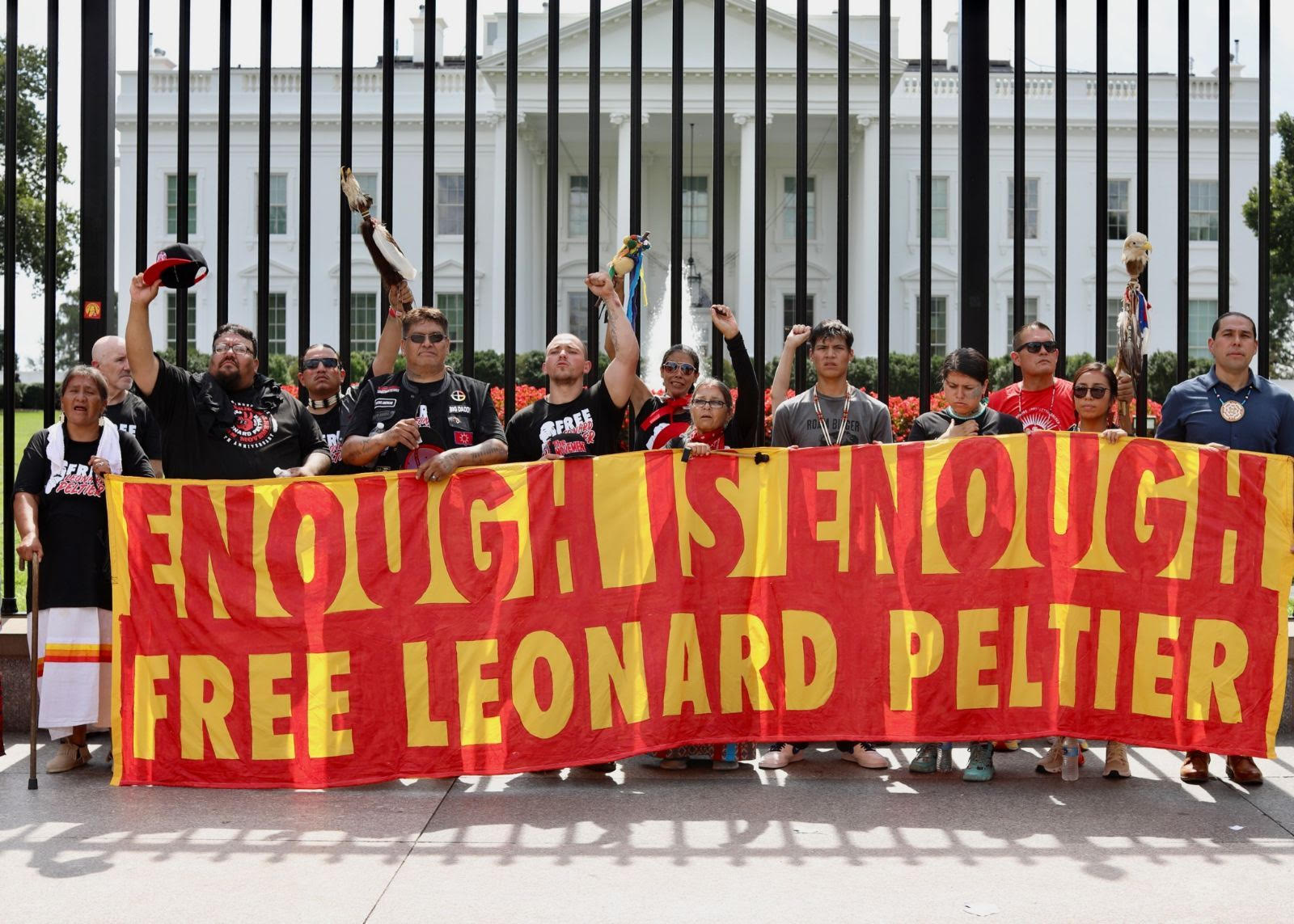
- Details
- By Amnesty International
Guest Opinion. Leonard Peltier, a Native American activist, has been imprisoned in the USA for nearly 50 years. Much of this time was spent in solitary confinement. He is serving two life sentences for murder, despite serious and ongoing concerns about the fairness of his trial. Peltier has always maintained his innocence.
Now 79 years old, Peltier contracted COVID-19 in 2022. He suffers from several chronic health issues, including one that could be fatal. On July 2, 2024, he was denied parole.
We urge President Biden to grant Leonard Peltier clemency. This act would be on humanitarian grounds and as a matter of justice.
Background
Leonard Peltier, an Anishinaabe-Lakota Native American, was a member of the American Indian Movement (AIM), which promotes Native American rights. On June 26, 1975, during a confrontation involving AIM members on the Pine Ridge Indian reservation in South Dakota, FBI agents Ronald Williams and Jack Coler were shot dead. AIM Member Joseph Stuntz was also killed. Leonard Peltier was convicted of their murders in 1977 and sentenced to two consecutive life sentences. Peltier has always maintained his innocence.
Myrtle Poor Bear, a Lakota Native woman, claimed to have seen Peltier kill both FBI agents. Based on her statement, Peltier was extradited from Canada, where he had fled. However, Poor Bear later retracted her testimony, stating that it was a result of threats and harassment from FBI agents. Although not called as a prosecution witness, the trial judge did not allow her as a defense witness, claiming her testimony could prejudice the government. In 2000, she publicly stated that her original testimony was coerced.
In 1980, Peltier’s lawyers received documents through the Freedom of Information Act. These documents contained ballistics evidence that could have helped Peltier’s case but were withheld during the trial. In 1986, the U.S. Court of Appeal for the Eighth Circuit denied a retrial, acknowledging some improper conduct by FBI agents but refusing to attribute more wrongdoing to them. The U.S. Parole Commission has repeatedly denied parole to Peltier, even though the prosecution conceded there was no direct evidence of his involvement in the FBI agents' deaths. James H. Reynolds, the U.S. Attorney involved in the case, later supported clemency for Peltier.
Peltier suffers from multiple health issues, including kidney disease, Type 2 diabetes, high blood pressure, a heart condition, and a degenerative joint disease. A 1986 stroke left him nearly blind in one eye. In January 2016, he was diagnosed with a life-threatening abdominal aortic aneurysm. He currently uses a walker due to limited mobility and contracted COVID-19 in 2022. He remains at risk of re-infection while in detention.
Many organizations and leaders, including the National Congress of American Indians, Tribal Leaders, Indigenous Peoples worldwide, and the United Nations Working Group on Arbitrary Detention, have called for Peltier’s release. In 2015, several Nobel Peace Prize winners, including Archbishop Desmond Tutu, supported his release. Peltier’s attorney applied for clemency to President Biden in July 2021, but no decision has been made as of July 2024. Due to the trial issues, exhausted legal appeals, the time already served, his maintained innocence, and chronic health problems, Leonard Peltier deserves clemency.
Write to President Joe Biden urging him to:
Grant Leonard Peltier clemency on humanitarian grounds and as a matter of justice.
Write to: President Joseph Biden
The White House 1600 Pennsylvania Ave NW
Washington, DC 20500
White House Comment line: (202) 456-1111 Webform*: https://www.whitehouse.gov/contact/
Salutation: Dear President Biden:
Help us defend tribal sovereignty.
At Native News Online, our mission is rooted in telling the stories that strengthen sovereignty and uplift Indigenous voices — not just at year’s end, but every single day.
Because of your generosity last year, we were able to keep our reporters on the ground in tribal communities, at national gatherings and in the halls of Congress — covering the issues that matter most to Indian Country: sovereignty, culture, education, health and economic opportunity.
That support sustained us through a tough year in 2025. Now, as we look to the year ahead, we need your help right now to ensure warrior journalism remains strong — reporting that defends tribal sovereignty, amplifies Native truth, and holds power accountable.
 The stakes couldn't be higher. Your support keeps Native voices heard, Native stories told and Native sovereignty defended.
The stakes couldn't be higher. Your support keeps Native voices heard, Native stories told and Native sovereignty defended.
Stand with Warrior Journalism today.
Levi Rickert (Potawatomi), Editor & Publisher

